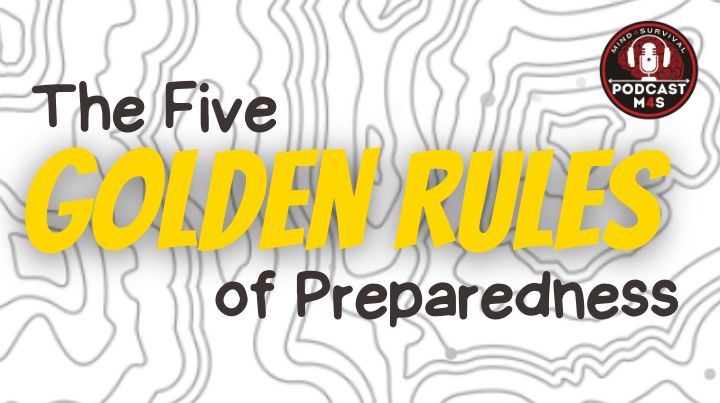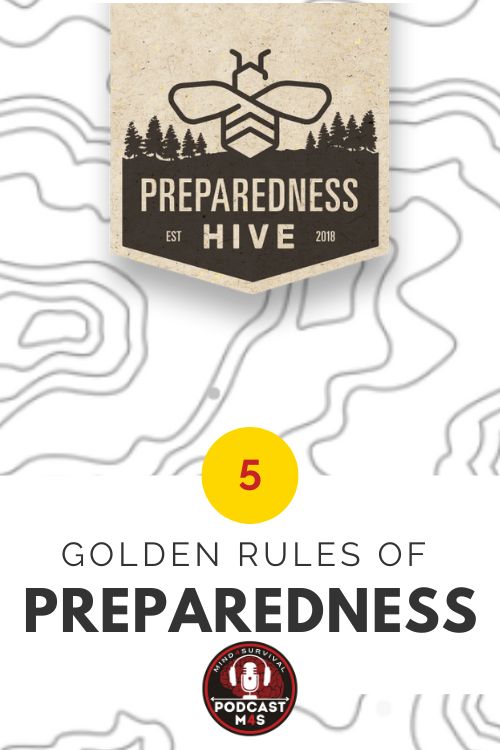154: The Five Golden Rules of Preparedness with Casey Telger


Podcast: Play in new window | Download
Casey Telger of PreparednessHive.com and I discuss Casey’s Five Golden Rules of Preparedness in this episode.
Casey’s Five Golden Rules of Preparedness are organic—growing from Casey’s personal preparedness journey. These are rules that apply to preparedness regardless of the situation. According to Casey, “You can’t skirt them. They are foundational elements of everyone’s journey.”
 1. Don’t Talk About Prepping
1. Don’t Talk About Prepping
Don’t talk specifics about your preparedness. Avoid getting into the “nitty-gritty aspects” of your preparedness. That does not mean you can’t still communicate about readiness. It’s great to have productive, non-doom and gloom conversations about preparedness with people that may help them and you to become better prepared. Not talking about your preparedness means not telling people who you don’t know, don’t need to know, or haven’t gained your appropriate level of trust about the specifics of your prepping.
2. Two is One. One is None
The “two is one, one is none” is not an excuse to hoard. Don’t just have things to have things. Try to minimize the “what if” scenarios as an excuse to hang on to stuff. Over time going without a mountain of stuff, you learn to focus on what is essential. The critical items are the items to focus on having two or more of. At some point, enough is enough.
Think about what you need from the necessities of life. If it’s something that you need to survive, have multiples of it. Base your supplies on what you need, with consideration given to the space available and the budget you have for purchasing. Effective prepping does not mean having a lot of stuff. Effective preparedness means efficient preparedness!
3. Knowledge and Experience are Your Greatest Assets
This rule flows from two is one, one is none. That’s because, as Casey says, “The more you know. The more you can do. The more you learn, the fewer physical items you’ll need in terms of your skills.” When you don’t know much, you stock up on stuff because you don’t know. However, as you gain experience, you learn what works for you and reduce your supply needs. It takes time and experience to figure it out. So, get going and learn what you need and don’t need.
4. There’s No Shortcut for Hard Work
Shortcuts don’t work. In the end, you must put time and energy into it. For example, if you never train with a firearm, you’ll never be a great shot with a gun. There are so many variables in your being capable of doing something. Without practice, you’ll be lacking when the chips are down. HINT: lacking when the chips are down is not a goal of preparedness.
5. Preparedness is a Lifestyle, Not a Hobby
Going into preparedness only half-ready doesn’t help you to be truly prepared. Preparedness, taking care of your personal responsibility to be as self-sufficient as possible, should be a regular part of your life. Cars, homes, and clothing need to be maintained. So does your preparedness. Preparedness shouldn’t be an add-on to life that only receives occasional attention. It should be a regular part of life because, in the end, you’re only as prepared as your weakest link.
What’s your weakest link? Tell us in the comments below.
Additional Resources
- All About Disaster Mindset
- Mental Fortitude: 7 Steps to Develop Mental Toughness
- What is Prepping? It’s More Than Stockpiling Food!
- The OK Corral: More of a Blowout than a Shootout
Stay safe,


2 Comments
Leave a Comment




Join Mind4Survival!
Stay informed by joining the Mind4Survival! 100% Secure! 0% Spam!
Follow Us!
Affiliate Disclosure
Mind4Survival is a free, reader-supported information resource. If you make a purchase through our link, we may, at no cost to you, receive an affiliate commission.



Being poorly prepared will be WAY better than not prepared at all when SHTF.
Prepping is not all-or-nothing.
That all depends upon your definition of being poorly prepared.